- Home
- Cormac McCarthy
Child of God Page 9
Child of God Read online
Page 9
The only thing that he recovered was the crate and it was empty. Once far downstream he thought he saw toy bears bobbing on the spate but they were lost from sight beyond a stand of trees and he was already nearer the highway than he wished and so turned back.
Ultimately he crossed higher in the mountains. A steep and black ravine in which a wild torrent sang. Ballard on a mossbacked footlog bent beneath his sodden mudstained mattress went with care, holding the rifle before him. How white the water was, how constant its form in the speeding flumes below. How black the rocks.
When he reached the sinkhole on the mountain the mattress was so heavy with rainwater that it staggered him. He crawled through a hole in the stone wall of the sink and pulled the mattress in after him.
All that night he hauled his possessions and all night long it rained. When he dragged the last rancid moldcrept corpse through the wall of the sinkhole and down the dark and dripping corridor daylight had already broached a pale gray band in the weeping sky eastward. His track through the black leaves of the forest with the drag marks of heels looked like a small wagon had passed there. In the night it had frozen and he came up through a field of grass webbed with little panes of ice and into a wood where the trees were seized in ice each twig like small black bones in glass that cried or shattered in the wind. Ballard's trousercuffs had frozen into two drums that clattered at his ankles and in the shoes he wore his toes lay cold and bloodless. He walked out from the sinkhole to see the day, nearly sobbing with exhaustion. Nothing moved in that dead and fabled waste, the woods garlanded with frostflowers, weeds spiring up from white crystal fantasies like the stone lace in a cave's floor. He had not stopped cursing. Whatever voice spoke him was no demon but some old shed self that came yet from time to time in the name of sanity, a hand to gentle him back from the rim of his disastrous wrath.
He built a fire in the floor of the cave by a running stream. Smoke gathered in the dome above and seeped slowly up through myriad fissures and pores and rose in a stygian mist through the dripping woods. When he tried the action of the rifle it was frozen fast. He knelt on the barrel and grappled with it, tearing at the lever with his hands. When it did not give he threw it into the fire. But fetched it out again and stood it against the wall before it had suffered more than a scorched forestock. He crushed wild chicory into the blackened coffeepot and dipped the pot full of water. It simmered and hissed and sang in the flames. Ballard's shadow veering dark and mutant over the cupped stone walls. He brought out a pan of cornbread partly eaten and set it by the fire where the dry crusts lay curled like clayshards in a summer gully.
In the black midday he woke half frozen and mended up the fire. Hot pains were rifling through his feet. He lay back down. The water in the mattress had soaked through to his back and he lay there shivering with his arms crossed at his chest and after a while he slept again.
When he woke it was to agony. He sat up and gripped his feet. He howled aloud. With gingery steps he crossed the stone floor to the water and sat and put his feet in. The creek felt hot. He sat there soaking his feet and gibbering, a sound not quite crying that echoed from the walls of the grotto like the mutterings of a band of sympathetic apes.
THE HIGH SHERIFF OF SEVIER County came down the courthouse steps as far as the last stone above the flooded lawn and gazed out over the water where it lay flat and gray and choked with debris, stretching in quiet canals up the streets and alleys, the tops of the parking meters just visible and off to the left the faintest suggestion of movement, a dull sluggish wrinkling where the mainstream of the Little Pigeon river tugged at the standing water in the flats. When the deputy came rowing across the lawn in the skiff the sheriff watched him with slowly shaking head. The deputy swung the rear of the skiff about and backoared until the transom banged against the stone landing.
Cotton, you a hell of a oarsman.
You goddamn right.
Where the hell you been?
The oarsman stayed the oars, the boat dipped heavily.
You goin to ride standin up like Napoleon? Reason I'm late I had to give Bill Scruggs a ticket.
A ticket?
Yeah. I caught him goin up Bruce Street speedin in a motorboat.
Horseshit.
The deputy grinned and dipped the oars. Ain't this the goddamnedest thing ever you seen? he said.
Rain drizzled lightly. The sheriff peered out at the flooded town from under his dripping hatbrim. You ain't seen a old man with a long beard buildin a great big boat anywheres have ye? he said.
They rowed up the main street of the town past flooded shops and small cafes. Two men came from a store with a rowboat piled with stained boxes and loose mounds of clothing. One oared the boat, one waded behind.
Mornin Sheriff, called out the man in the water, raising his hand.
Mornin Ed, said the sheriff.
The man in the boat gestured with his chin.
Did Mr Parker see you? said the man in the water.
We're just goin up there now.
Seems like trouble ought to make people closer stead of some tryin to rob others.
Some people you cain't do nothin with, the sheriff said.
Ain't that the truth.
They rowed on. Take care, said the sheriff.
Right, said the man in the water.
They rowed into the hardware store entranceway and the deputy shipped the oars. Inside by lamplight people were moving about sloshing heavily through the water. A man climbed into the showcase window and peered out at the sheriff through the broken glass.
Howdy Fate, he said.
Howdy Eustis.
Biggest thing they took was guns.
That's what they take.
I don't even know how many. I expect we'll find stuff missin for a year.
Can you get the numbers on em?
Not till the waters recede. If they ever do. The inventory sheets are in the basement. Well.
It's supposed to clear tomorrow. Although at this point I really don't give a shit. Do you?
It's the worst I ever saw in my time, the sheriff said. It was supposed to of flooded in 1885 they said the whole town was under water.
Is that right?
So I've heard, said the deputy.
I know it's burned down about a half a dozen times, said the storekeeper. You reckon there are just some places the good lord didn't intend folks to live in?
Could be, said the sheriff. He's got a bullheaded bunch to deal with here if it's so though, ain't he?
Damned if he don't.
Anything I can help ye with?
Naw, hell. We're tryin to salvage some of this stuff. I don't know. It sure is a hell of a mess.
Well. When you get those numbers let me have em. They'll most likely show up over in Knoxville.
I'd rather have the sons of bitches that stole em as have the guns back.
I know what you mean. We'll do our best.
Well.
Well, let me get my inboard cranked up here and we'll go pick up the mail.
The deputy grinned and dipped the oars into the gray water among the bottles and boards and floating fruit.
I'll talk to you later, Fate, said the storekeeper.
Okay Eustis. I hate it about your bein broke into. Well.
They rowed on up the street and beached the skiff on the front steps of the post office and went in.
Mornin Sheriff Turner, said a pleasant woman from behind the barred window.
Mornin Mrs Walker, how you?
Wet. What about you?
Ain't this somethin?
She eased a bundle of mail beneath the bars.
This it?
That's it.
He leafed through the mail.
You ever find any of them people missin from them cars?
When we find one we'll find em all.
Well when are ye goin to find the one?
We'll find em.
I never knew such a place for meanness, the woman said.
/>
The sheriff smiled. It used to be worse, he said. Rowing back down Bruce Street they were hailed from an upper window. The sheriff leaned back to see who'd spoke, eyes squinted against the fine rain.
You goin to the courthouse, Fate?
Sure am.
How about a ride?
Come on.
Just let me get my coat I'll be right down.
An old man appeared at the top of a flight of stairs that ascended the side of a brick store building. He shut the door behind him and adjusted his hat and came down the steps with care. The deputy backed until the rear of the skiff came up against the stairs and the old man, taking a vicious grip on the sheriff's shoulder, stepped in and sat down.
Old woman told me today, said: It's a judgment. Wages of sin and all that. I told her everbody in Sevier County would have to be rotten to the core to warrant this. She may think they are, I don't know. How you, young feller?
Fine, said the deputy.
Here's a man can tell ye about the White Caps, said the sheriff.
People don't want to hear about that, said the old man.
Cotton here said it sounded like a good idea to him, the sheriff said. Keep people in line.
The old man studied the rowing deputy. Don't believe it, son, he said. They was a bunch of lowlife thieves and cowards and murderers. The only thing they ever done was to whip women and rob old people of their savins. Pensioners and widows. And murder people in their beds at night.
What about the Bluebills?
They was organized to set against the White Caps but they was just as cowardly. They'd hear the White Caps was ridin out someplace, like Pigeon Forge, they'd get out there and take up the boards in the bridge and lay in the bushes where they could hear em to fall through. They hunted one another all over the county for two year and never met but one time and that was by accident and in a narrow place where neither bunch couldn't run. No, those were sorry people all the way around, ever man jack a three hundred and sixty degree son of a bitch, which my daddy said meant they was a son of a bitch any way you looked at em.
What finally happened?
What finally happened was that one man with a little guts stood up to em and that was Tom Davis.
He was a wheelhorse wasn't he, Mr Wade.
He was that. He was just a deputy under Sheriff Millard Maples when he busted up the White Caps. He made three or four trips to Nashville, paid for it out of his own pocket. Got the legislature to pass a bill attaching the Circuit Court to the Criminal Court over in Knoxville so that they'd have a new judge in Sevierville and then he started after the White Caps. They tried ever way in the world to kill him. Even sicked a big nigger on him one night comin back from Knoxville. In them days you could go by steamboat and this nigger come off another boat in the middle of the river and pulled a gun to shoot him. Tom Davis took the gun away from him and just brought him on in to jail. By that time White Caps was leavin the county in droves. He didn't care where they went. He brought em back from Kentucky, from North Carolina, from Texas. He'd go off all by hisself and be gone weeks and come in with em on a string like a bunch of horses. He was the damnedest man I ever heard of. Was a educated man. Had been a school teacher. There had not been a Democrat elected in Sevier County since the Civil War, but when Tom Davis run for sheriff they elected him.
You don't remember the flood of 1885 do ye? said the deputy.
Well, bein as that was the year I was born my memory of it is somewhat dim.
What year was it they hung them two, Mr Wade.
That was in 99. That was Pleas Wynn and Catlett Tipton that had murdered the Whaleys. Got em up out of bed and blowed their heads off in front of their little daughter. They'd been in jail two years appealin and what not. There was a Bob Wade implicated in it too that I'm proud to report is no kin of mine. I think he went to the penitentiary. Tipton and Wynn, they hung them on the courthouse lawn right yonder. It was right about the first of the year. I remember there was still holly boughs up and christmas candles. Had a big scaffold set up had one door for the both of em to drop through. People had started in to town the evenin before. Slept in their wagons, a lot of em. Rolled out blankets on the courthouse lawn. Wherever. You couldn't get a meal in town, folks lined up three deep. Women sellin sandwiches in the street. Tom Davis was sheriff by then. He brung em from the jail, had two preachers with em and had their wives on their arms and all. Just like they was goin to church. All of em got up there on the scaffold and they sung and everbody fell in singin with em. Men all holdin their hats. I was thirteen year old but I remember it like it was yesterday. Whole town and half of Sevier County singin I Need Thee Every Hour. Then the preacher said a prayer and the wives kissed their husbands goodbye and stepped down off the scaffold and turned around to watch and the preacher come down and it got real quiet. And then that trap kicked open from under em and down they dropped and hung there a jerkin and a kickin for I don't know, ten, fifteen minutes. Don't ever think hangin is quick and merciful. It ain't. But that was the end of White Cappin in Sevier County. People don't like to talk about it to this day.
You think people was meaner then than they are now? the deputy said.
The old man was looking out at the flooded town. No, he said. I don't. I think people are the same from the day God first made one.
As they ascended the courthouse stairs he was telling them how an old hermit used to live out on House Mountain, a ragged gnome with kneelength hair who dressed in leaves and how people were used to going by his hole in the rocks and throwing in stones on a dare and calling to him to come out.
IN THE SPRING BALLARD watched two hawks couple and drop, their wings upswept, soundless out of the sun to break and flare above the trees and ring up again with thin calls. He eyed them on, watching to see if one were hurt. He did not know how hawks mated but he knew that all things fought. He left the old wagonroad where it went through the gap and took a path that he himself kept, going across the face of the mountain to review the country that he'd once inhabited.
He sat with his back to a rock and soaked the warmth from it, the wind still cold that shivered the sparse high mountain bracken, the brittle gray ferns. He watched an empty wagon come up the valley below him, distant clatter of it, the mule pausing in the ford and the clatter of the immobile wagon rolling on regardless as if the sound authored the substance, until it had all reached his ears. He watched the mule drink and then the man on the wagonseat lifted one arm and they commenced again, now soundless, out of the creek and up the road and then again came the far muted wooden rumbling.
He watched the diminutive progress of all things in the valley, the gray fields coming up black and corded under the plow, the slow green occlusion that the trees were spreading. Squatting there he let his head drop between his knees and he began to cry.
LYING AWAKE IN THE DARK of the cave he thought he heard a whistling as he used to when he was a boy in his bed in the dark and he'd hear his father on the road coming home whistling, a lonely piper, but the only sound was the stream where it ran down through the cavern to empty it may be in unknown seas at the center of the earth.
He dreamt that night that he rode through woods on a low ridge. Below him he could see deer in a meadow where the sun fell on the grass. The grass was still wet and the deer stood in it to their elbows. He could feel the spine of the mule rolling under him and he gripped the mule's barrel with his legs. Each leaf that brushed his face deepened his sadness and dread. Each leaf he passed he'd never pass again. They rode over his face like veils, already some yellow, their veins like slender bones where the sun shone through them. He had resolved himself to ride on for he could not turn back and the world that day was as lovely as any day that ever was and he was riding to his death.
ON A GOOD MAY MORNING John Greer turned out to dig a septic tank at the back of his house. While he was digging, Lester Ballard in frightwig and skirts stepped from behind the pump-house and raised the rifle and cocked the hammer silently, hold
ing back the trigger and easing it into the notch as hunters do.
When he fired the shovel was coming past Greer's shoulder with a load of dirt. Long after the crack of the rifle had died in the lee of the mountain he could hear the gong of turned doom that rang above the man's head as he froze there with the shovel aloft on which had splattered in a bright medallion the small piece of lead, the man looking at whatever it was standing there cursing to itself while it worked the lever of the rifle, an apparition created whole out of nothing and set upon him with such dire intent. He flung away the shovel and began to run. Ballard shot him through the body as he passed and stitched a falter in his pace. He shot him once more before he rounded the corner of the house but he could not tell where he hit him. He himself was running now, cursing steadily, working the lever of the rifle again, taking the corner of the house, one foot almost going from under him as he turned and making a vicious slash in the mud, the rifle now in one hand and his thumb hooked over the hammer, mounting the steps in a crazy sort of hopping gait and rushing toward the door.
He looked like something come against the end of a springloaded tether or some slapstick contrivance of the filmcutter's art, swallowed up in the door and discharged from it again almost simultaneously, ejected in an immense concussion backwards, spinning, one arm flying out in a peculiar limber gesture, a faint pink cloud of blood and shredded clothing and the rifle clattering soundless on the porchboards amid the uproar and Ballard sitting hard on the floor for a moment before he pitched off into the yard.
Even though Greer was shot through the upper chest himself he wobbled from the doorway with the shotgun and down the steps to examine this thing he'd shot. At the foot of the steps he picked up what appeared to be a wig and saw that it was fashioned whole from a dried human scalp.
BALLARD WOKE IN A ROOM dark to blackness.
He woke in a room day bright.
Woke in a room at dawn or dusk he knew not which where motes of dust passing through an unseen bar of light incandesced briefly and random and drifted like the smallest fireflies. He studied them for a while and then raised his hand. No hand came up. He raised the other and a thin stripe of yellow sunlight fell across his forearm. He looked about the room. Some stainless steel pots on a steel table. A pitcher of water and a glass. Ballard in a thin white gown in a thin white room, false acolyte or antiseptic felon, a practitioner of ghastliness, a part-time ghoul.

 The Road
The Road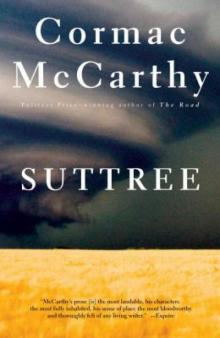 Suttree
Suttree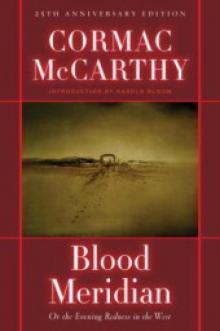 Blood Meridian, or the Evening Redness in the West
Blood Meridian, or the Evening Redness in the West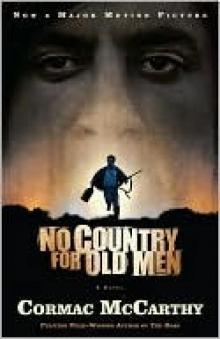 No Country for Old Men
No Country for Old Men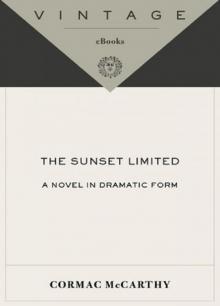 The Sunset Limited
The Sunset Limited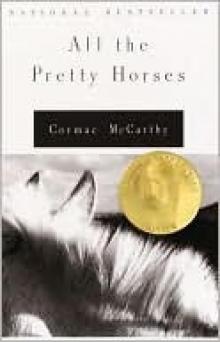 All the Pretty Horses
All the Pretty Horses The Crossing
The Crossing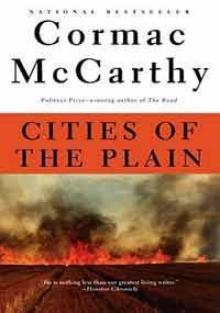 Cities of the Plain
Cities of the Plain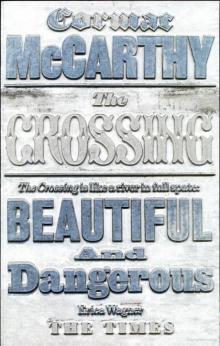 The Crossing tbt-2
The Crossing tbt-2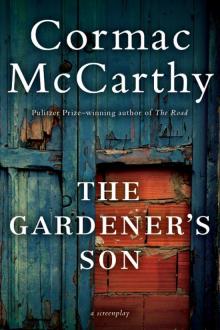 Gardener's Son
Gardener's Son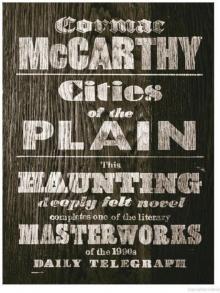 Cities of the Plain tbt-3
Cities of the Plain tbt-3 The Stonemason
The Stonemason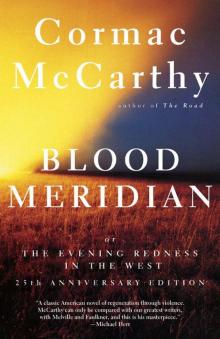 Blood Meridian: Or the Evening Redness in the West (Vintage International)
Blood Meridian: Or the Evening Redness in the West (Vintage International)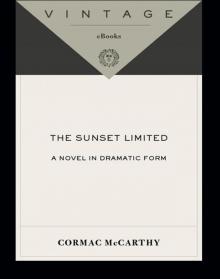 The Sunset Limited: A Novel in Dramatic Form
The Sunset Limited: A Novel in Dramatic Form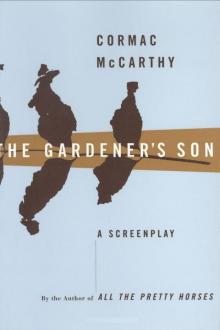 The Gardener's Son
The Gardener's Son